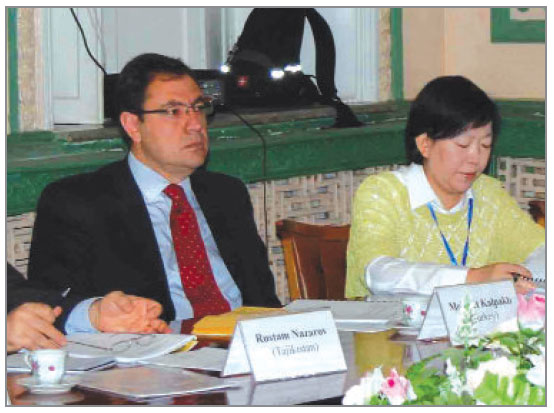Asst. Prof. Mehmet Kalpaklı Represents Turkey at UNESCO's IICAS Meeting
BY ALP RODOPLU (HIST/V)
Asst. Prof. Mehmet Kalpaklı, chair of the Department of History, represented Turkey October 4-5 at the 14th session of the Academic Council of the UNESCO-sponsored International Institute for Central Asian Studies (IICAS), held in Samarkand, Uzbekistan.
At last year's Academic Council meeting, held in Antalya for IICAS's 13th session, Dr. Kalpaklı directed the proceedings of the academic symposium, and Bilkent University scholars gave fully half of the papers. Since the beginning of this year, Dr. Kalpaklı  has been Turkey's IICAS representative as an appointee of the Ministry of Culture and Tourism, a post previously held by Prof. İlber Ortaylı and Prof. İsenbike Togan.
has been Turkey's IICAS representative as an appointee of the Ministry of Culture and Tourism, a post previously held by Prof. İlber Ortaylı and Prof. İsenbike Togan.
The theme of this year's meeting was the "Culture of the Asian Peoples Along the Great Silk Road." Dr. Kalpaklı spoke on the topic of "The Silk Road as a Metaphor for Intercultural Dialogue" in the plenary session. He argued that the Silk Road--the longest and most efficient transportation network of premodern times, which came into existence gradually as an amalgamation of hundreds of ancient trade routes--bears the marks of many cultures, religions and civilizations as much as it bears the marks of economics and politics. Consequently, it was "over" and "across" (meta-) vast geographies that this road "carried" (+pherein) not only commercial goods, but also the most spectacular intellectual and cultural produce of many lands, thus creating a space of peaceful contact within which intercultural dialogue became an actuality. Dr. Kalpaklı believes that in the example of the Silk Road, the same kind of dialogue may be reestablished between the West and the East, among diverse societies, nations and religions.
IICAS was set up in 1995 within the framework of UNESCO's projects for the World Decade for Cultural Development (1987-1997) as an outcome of one of those projects: "Integral Study of the Silk Roads: Roads of Dialogue." Its aim is to raise awareness in the international community of historical and cultural issues regarding Central Asia and to provide opportunities for collaboration among local and international scholars.